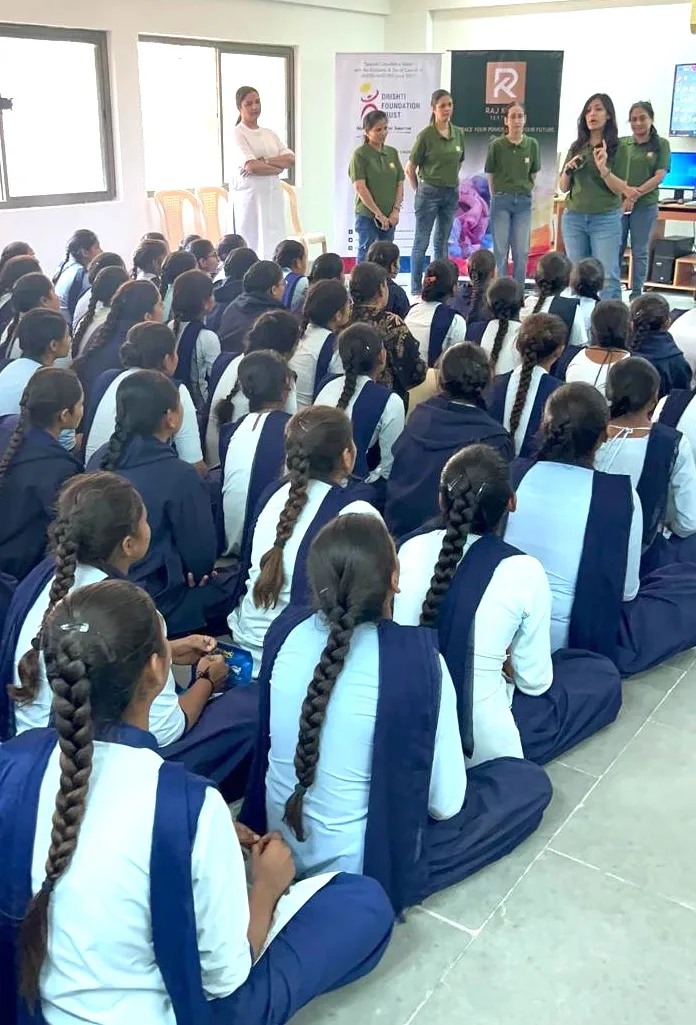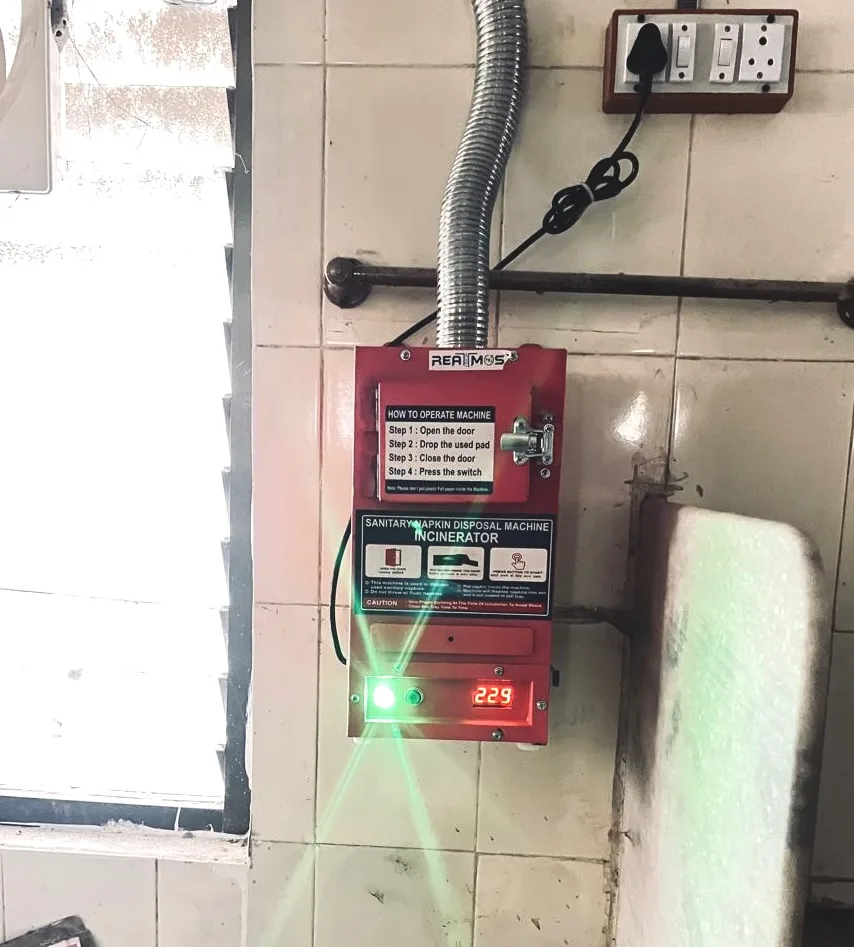Breaking the Taboo: Providing Sanitary Hygiene Solutions in Schools
Access to menstrual hygiene products is a fundamental right that should not be compromised for any girl or woman. However, in many parts of the world, especially in rural areas, girls face significant challenges in managing their menstruation due to the lack of access to affordable and hygienic menstrual products. Drishti Foundation Trust, a global non-profit philanthropy organization working on health, education, and environment, is committed to addressing this issue and empowering girls to manage their menstruation with dignity and confidence. As part of our Corporate Social Responsibility (CSR) implementation initiative, we recently installed a sanitary napkin dispenser in Modal School, Sanand, with the aim of promoting menstrual health and hygiene among female students.

Menstruation is a natural and inevitable aspect of a woman’s life, yet it continues to be shrouded in stigma and shame in many parts of the world. Lack of access to menstrual hygiene products and facilities not only affects the physical health and well-being of girls and women but also hinders their ability to participate fully in education and daily activities. At Drishti Foundation Trust, we are committed to breaking the taboo surrounding menstruation and ensuring access to menstrual hygiene products for all. In line with this commitment, we recently installed sanitary napkin dispensers in Modal School, Sanand, as part of our initiative to promote menstrual health and hygiene in schools.
Why Menstrual Hygiene Matters:
Menstrual hygiene management (MHM) is essential for the health, dignity, and empowerment of girls and women. Access to clean and hygienic menstrual products, along with adequate sanitation facilities, is crucial for maintaining menstrual health and preventing infections. Unfortunately, many girls around the world face significant barriers to managing their menstruation safely and hygienically. These barriers include a lack of access to menstrual products, inadequate sanitation facilities, and social taboos and stigma surrounding menstruation.
The Impact of Menstrual Hygiene on Education:
The lack of access to menstrual hygiene products and facilities often leads to absenteeism and dropout rates among girls, particularly in low-resource settings. Many girls miss school during their menstrual periods due to discomfort, embarrassment, or the inability to manage their menstruation effectively. This not only affects their academic performance but also perpetuates cycles of poverty and inequality. By addressing the menstrual hygiene needs of girls and providing them with the necessary support and resources, we can help break down barriers to education and empower girls to reach their full potential.
Our Initiative: Installing Sanitary Napkin Dispensers in Schools

As part of our commitment to promoting menstrual health and hygiene, Drishti Foundation Trust launched an initiative to install sanitary napkin dispensers in schools. Our goal is to ensure that girls have access to menstrual hygiene products within the school premises, enabling them to manage their menstruation with dignity and confidence. The installation of sanitary napkin dispensers not only provides girls with access to affordable and hygienic menstrual products but also helps destigmatize menstruation and promote open discussions about menstrual health.
Modal School, Sanand: A Case Study
Modal School, located in the rural area of Sanand, was selected as the pilot location for our initiative. The school serves a diverse population of students, including many from low-income families. Despite the efforts of the school administration to promote hygiene and sanitation, access to menstrual hygiene products remained a challenge for many female students. Recognising the need for intervention, Drishti Foundation Trust collaborated with the school authorities to install sanitary napkin dispensers on the premises.
The Impact of the Initiative:
Since the installation of the sanitary napkin dispensers in Modal School, Sanand, we have witnessed several positive outcomes:
Increased Access to Menstrual Hygiene Products: The availability of sanitary napkin dispensers has ensured that female students have access to menstrual hygiene products whenever they need them. This has empowered girls to manage their menstruation more effectively and comfortably, leading to a reduction in absenteeism and dropout rates.
Improved Health and Well-being: Access to clean and hygienic menstrual products has contributed to the improved health and well-being of female students. By using sanitary napkins instead of unhygienic alternatives, such as cloth rags or leaves, girls are less susceptible to infections and other menstrual-related health issues.
Enhanced Dignity and Confidence: The provision of sanitary napkin dispensers has helped destigmatize menstruation and promote a culture of openness and acceptance. Girls no longer feel ashamed or embarrassed about their periods but instead feel empowered to talk openly about menstrual health and hygiene. This has boosted their self-esteem and confidence, allowing them to focus more on their studies and personal development.
Positive Impact on School Environment: The initiative has had a ripple effect on the overall school environment, fostering a sense of inclusivity and support for female students. By prioritizing menstrual health and hygiene, Modal School has demonstrated its commitment to gender equality and the well-being of all its students.
Challenges and Lessons Learned:
While the installation of sanitary napkin dispensers has been a significant step forward in promoting menstrual hygiene in schools, we have also encountered challenges along the way. These include logistical issues, such as ensuring a steady supply of menstrual products and maintaining the dispensers, as well as addressing cultural barriers and misconceptions surrounding menstruation. However, through ongoing collaboration with school authorities, community members, and other stakeholders, we have been able to overcome these challenges and continue our efforts to promote menstrual health and hygiene.
Moving Forward: Scaling Up and Replication
The success of our initiative in Modal School, Sanand, has inspired us to scale up our efforts and replicate the model in other schools and communities. We are committed to working with local partners, government agencies, and donors to expand access to menstrual hygiene products and facilities and promote menstrual health education. By leveraging our network and resources, we aim to create a world where menstruation is no longer a barrier to education, health, and dignity for girls and women everywhere.
Conclusion:
Access to menstrual hygiene products is a basic human right that should be available to all girls and women, regardless of their socioeconomic status or geographic location. By installing sanitary napkin dispensers in schools and promoting menstrual health and hygiene, Drishti Foundation Trust is taking a crucial step towards breaking the taboo surrounding menstruation and empowering girls to reach their full potential. Together, we can create a world where every girl has the opportunity to manage her menstruation with dignity, confidence, and pride.
Contact us to explore collaboration opportunities, learn more about our initiatives, or contribute towards making a difference that truly matters.
Facebook: https://www.facebook.com/DrishtiFoundationTrust/
Instagram : https://www.instagram.com/drishtifoundation
Youtube : https://www.youtube.com/drishtifoundationtrust
Twitter : https://www.twitter.com/dftindia

